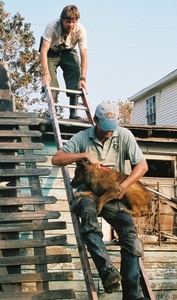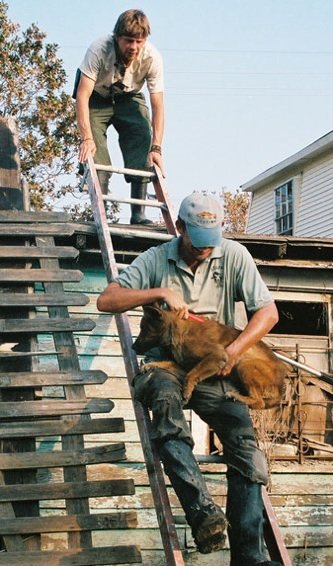Five years ago, Americans watched with heartache and horror as thousands of companion animals were abandoned in a drowning city. Karen O’Toole was moved to do more. In her beautifully moving account, Orphans of Katrina, O’Toole recounts her experiences of rescue and frustration, disillusionment and redemption in the Gulf region. The book is for anyone who wants to know what it was really like on the ground in the aftermath of Hurricane Katrina–and for everyone who wants to prevent another such tragedy.
How did your interest in animal rescue begin?
I was always very aware of the animals around me. Much more than my siblings. As a child I was afraid to run across the lawn as I’d crush the ants. I would always scoop struggling bees out of the pool and swish them up out of the water. I’d also have elaborate burial ceremonies whenever I found a dead bird, squirrel, anything. From a very young age I was conscious of the voiceless living creatures around me. I was pre-wired to do animal rescue.
How did you become involved with the Katrina rescue efforts?
On TV I watched boats full of media going right past animals that were stuck on roofs and in treetops and realized no one had time to retrieve them. I knew sending a check to some animal group was not enough. No amount of money could fix this without boots on the ground.

Why did you write this book?
I felt a responsibility to the animals to tell their tale. Their final cries were unheard; their final struggles unknown. And no one was telling their story, the real story. I wanted these animals to be remembered. They died scared and alone. I just had to say–“I remember you. You will not be forgotten. I will tell your tale.”
How did the Katrina rescue change your life?
Like most people, I was aware of the overcrowded shelters in the USA, and the mass killing of pets nationwide, but it wasn’t up-front-and-center in my life. I didn’t think about it on a daily basis. It wasn’t consuming me. But when you are on the ground in a disaster like Katrina and you save a pet–and then realize that if you put that pet into the system, that another pet will be killed to make room–when it becomes that real, that apparent, that in-your-face–it’s startling.
You can no longer sit back and do nothing. You cannot let it be someone else’s problem. So after Katrina, I became fully aware that every moment–the clock is ticking for tens of thousands of sweet, innocent animals all across the nation. And I must help them. For me it’s a much more heartbreaking world than it used to be.
In the book, I put hundreds of things people can do today to help animals. Even where to take free government courses to become a certified disaster responder, and how to reach all media to get attention for a cause. There is so much we can all do right from our homes, without spending a penny.

How did the situation affect your perception of humans and of animals?
I experienced the true love and loyalty of animals for their humans. I tell many stories in the book, like Allen’s Story. A dog I found a year after Katrina, living in the ghetto of downtown New Orleans. When we found the owner, I asked what his dog was doing downtown, when they lived 16 miles away. The man said, “On that corner, a year ago, I got on a helicopter and was taken away. It is the last place I ever saw my dog.” And that dog stayed there for a year waiting. Right there. On that corner. This was so typical of animals.
As far as humans, I realize now that a handful of people are sweeping up after the rest of the nation that does not spay/neuter . And too many people leave pets to die in pounds while they buy from puppy mills . And so many people leave their pets behind in locked-up, foreclosed upon homes. Sadly, after seeing what I have seen, I have mixed feelings about people now. I have seen far too much cruelty. It’s not Pit Bulls , but man who is the ultimate bully breed.
Tell us a happy rescue story that didn’t make it into the book.
A young New Orleans resident was crying outside a FEMA tent as she no longer had a home and her dog now had to live in her car. I called around trying to find a foster for the dog, but as you know, no one had a home there. After many calls, I reached a local woman I had met, Tina, who agreed to help out and foster the dog temporarily. It was a tough decision for Tina as she was grieving over the loss of her own dog. The young girl and I drove the dog about 20 miles to Tina’s house to discover that this dog was Tina’s lost dog! Tina had lost her beloved dog months before Katrina and was grieving for him ever since. The young girl found the dog and took him in. And now the dog was returned to his real home. If Tina had said no, that she could not foster this dog, she would never have know that I was standing there with her very own beloved pet and they may never have been reunited.
What’s next for you?
I’m writing a comedy.





